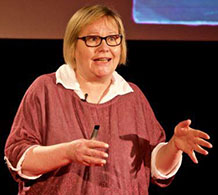
Dr Kath Maguire
Research Fellow
K.Maguire@exeter.ac.uk
01872 258164
Knowledge Spa Research Office 2
University of Exeter Medical School, Knowledge Spa, Royal Cornwall Hospital, Truro, TR1 3HD
Overview
Kath is Assistant Director for Involvement and Engagement with the National Institute for Health and Care Research (NIHR) School for Public Health Environments Research Exeter (SPHERE). In SPHERE they lead on work on coproducing approaches to tackling health inequalities in rural and coastal areas and nationally they lead on public involvement to support the NIHR School for Public Health Research (SPHR) theme of Healthy Places, Helthy Planet. They are based in the European Centre for the Environment and Human Health, and support the Health and Environment Public Engagement (HEPE) group in the southwest. They completed their PhD in 2014 at the Peninsula College of Medicine and Dentistry with a theses entitled 'Public and Patient Involvement in Theory and in Practice'. This was supported by the NIHR Collaboration for Leadership in Applied Health Research and Care, PenCLAHRC. Before undertaking that study Kath had been one of the founder members of the PenCLAHRC public and patient involvement group.
Qualifications
MA Cantab
MA Exon
PhD PCMD
Career
As a former carer, Kath used that personal experience to inform lay roles with NIHR funding panels and the General Medical Council Reference Community. They were a member of the National Community Forum, which sat within the Department for Communities and Local Government, taking part in their panel on community involvement across government. They also worked with Empowering Communities, the south west regional cross sectoral consortium on public engagement. They were part of a social enterprise, researching community involvement in Local Strategic Partnerships for the Joseph Rowntree Foundation. Their work with local community sector groups has focused on community based learning and active citizenship support. They held an NIHR Knowledge Mobilisation Fellowship from 2017-2021.
Research
Research projects
Mobilising knowledge to patients and wider publics. What works and who does it work for?
This project addresses practical knowledge mobilisation (KMb) and KMb research in involvement arenas
described by sociologists as ‘knowledge spaces’. These are where people with different sorts of knowledge meet, to share perspectives about an issue. Knowledge spaces in health and social care may involve several professionals (researchers/clinicians/managers/commissioners/public health officials, etc.) engaging with lay publics (patients/carers/citizens and communities).
Examples include:
- Patient/community forums working with researchers/service development initiatives
- governance bodies with patient/public representatives overseeing research, funding, service provision or
- commissioning
- activist groups campaigning about patient safety or service provision.
Policy makers and funders identify patient and public involvement/engagement as a priority, Ideally knowledge is mobilised in both directions, to inform individual health/lifestyle decisions, and to design/commission better services/interventions. But if done badly it can be experienced as tokenistic and alienating.
Interactions between multiple stakeholders and their different relationship with organisational, social and policy contexts make these ‘knowledge spaces’ intrinsically complex. This makes it implausible that a single approach to addressing KMb will be straightforwardly transferrable to all settings.
By combining a realist review with participatory action research methodology KMb mechanisms will be identified and used to tailor and trial individual KMb strategies. Community based knowledge champions will be identified and supported. By supporting educators involving patients and communities in medical teaching, this learning can be embedded in developing curricula.
Research question:
In complex cross-sectoral health ‘knowledge spaces’ which include multiple stakeholders, what enables the KMb that addresses different stakeholder priorities and what can be done to foster that process?
Key research aims are to:
- map support for patient, public and community access to research evidence and information about
- opportunities to influence research and care as complex programmes
- develop methodology for active KMb in multi-sector knowledge spaces in health research and care
- advance theoretical understandings of structures and processes.
- promote the practice and teaching of patient and public involvement as KMb
Smartline
Looking at how smart technology can support health and welbeing in the community.
Research grants
- 0 National Institute for Health HSR Programme
Knowledge Mobilisation Research Fellowship



